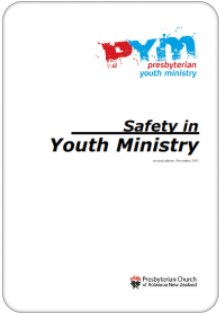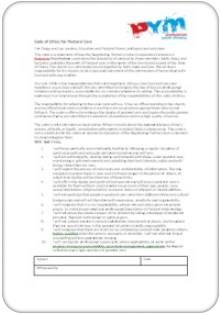- We believe it is important to follow best practice guidelines in the way we manage our youth ministry.
- We promise to provide clear procedures and supportive structures to assist our youth leader in managing our youth ministry.
What practical support and guidelines should you provide for your youth leader?
In exactly the same way that you have entrusted the youth leader to provide a programme that supports, encourages, and at times challenges, the young people, your youth leader should expect you to provide them with the support and encouragement, and occasional challenges, that they need to best serve the church.
Volunteers like to know what is expected of them in their roles. Work together with the youth leader to articulate a “role description.” This includes spending time thinking about what you want the youth leader to achieve with the young people; and making sure that they have the resources (time, money, venue, equipment, etc.) to do this. Realistic expectations, recognising the obvious time limitations involved for a volunteer, should be in place and clearly communicated.
Good communication does not just happen; good communication happens when a good communication strategy is in place. Regular communication between the local church governing body (whether the clergy, church board, a committee, etc.) and the youth leader will help them flourish in their volunteer role. It is important for your youth leader to know what communication policies are in place in relationship to their role. To whom (whether an individual or group) is the youth leader expected to report? How often? What kinds of information should they be sharing about the youth ministry? What format should this reporting take, whether an oral report at a group meeting, a conversation with an individual, or a written report? If a written report is expected, what structure should it follow? What kind of communication should the youth leader expect from the local church governing body? If a problem or circumstance arises outside of regularly scheduled communication, to whom should the youth leader turn?
In addition to a good communication strategy, churches with a volunteer youth leader should have some protective policies in place to help support the youth leader. Rather than expecting the youth leader to develop these personally, it is wise for a church to have written policies regarding the safety of young people. These might include required youth to adult chaperone ratios for trips, guidelines around transport of young people, and rules around appropriate/inappropriate interactions between adults and young people in the youth ministry, among many other things. These kinds of policies serve as a solid foundation on which the youth leader can build a safe, healthy youth ministry programme.
Churches should work to build trust and respect with the youth leader through clear expectations, mutually-understood communication strategies, and well-developed policies. This kind of supportive management structure will help create the conditions in which the youth leader can thrive, and this means the ministry with your young people can thrive too.
Questions to consider
- Are there structures in place to ensure that the necessary resources (time, money, venue, equipment, etc.) to lead the youth ministry are available for the youth leader?
- How does your church governing body and youth leader communicate? How often?
- Does your church have written policies for the youth leader on key areas like child protection, health and safety and volunteer recruitment?
Ideas to help you meet this promise
- Ask your volunteer youth leader what resources they might need to serve more effectively in the youth ministry and put into place an action plan to help meet this need.
- Develop a clearly written communication strategy for your youth leader and local church governing body (including the details of how communication happens, what it should cover, and how often it should happen).Review (or start to develop for the first time) your church’s written policies on key areas like child protection, health and safety and volunteer recruitment. Check with your denomination/church network to see what policies may already be available to you. You may find the Code of Ethics for Youth Work in Aotearoa New Zealand to be a helpful resource. (http://www.arataiohi.org.nz/Code). After you have developed these policies, communicate them to your youth leader.
What your church needs to do
- The church needs to plan to take two actions in the coming year related to this promise. Those actions do not necessarily need to be the suggestions made above. They can also include things that the church has already done previously and is planning to continue to do in the coming year.








 .Safety in Youth Ministry
.Safety in Youth Ministry


